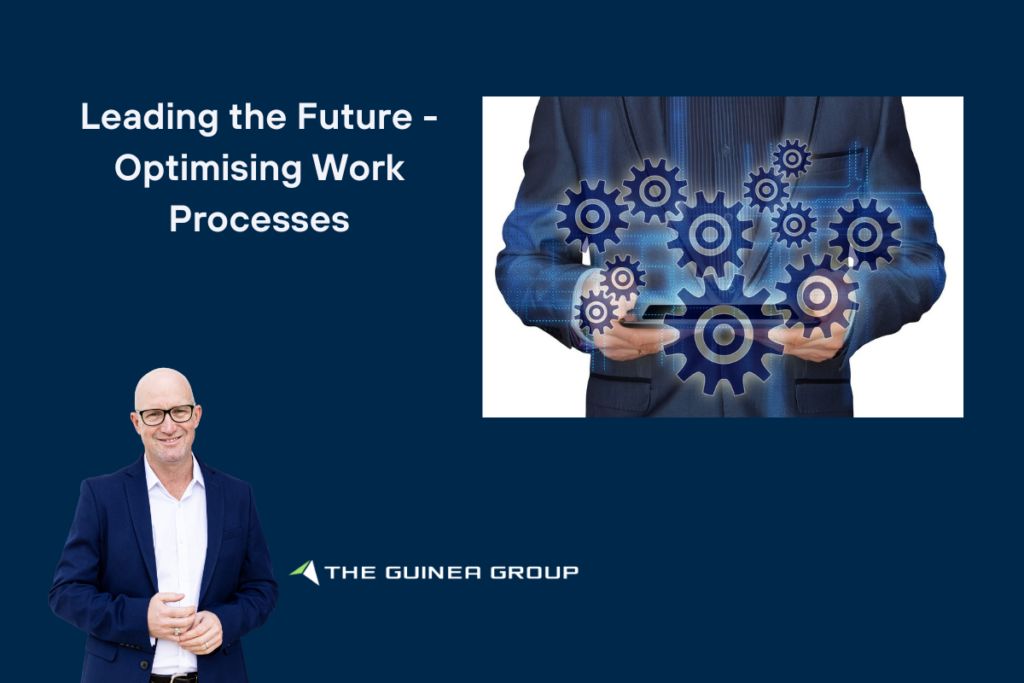Anton Guinea
Entrepreneur, Speaker, bestselling author, and founder of The Guinea Group of Companies. For over 15 years, Anton has helped leaders move their teams to become psychologically safe, physically safe and overall better versions of themselves.

Leading the Future – Optimising Work Processes

In 2024, optimising work processes is no longer just a strategic advantage—it’s a necessity.
It has also never been easier.
Leaders who are committed to optimisation and enhancement can see significant gains in the effectiveness and efficiency of their teams.
With sometimes just a few keystrokes.
To be competitive in 2024 and into the future, leaders must continually seek ways to streamline operations, enhance productivity, and foster a culture of continuous improvement.
In this Newsletter, we’ll dive into three essential steps leaders can take to optimise work processes and propel their teams toward sustained success.
1. Embrace Automation and AI
Why It Matters:
Automation and Artificial Intelligence (AI) have revolutionised the way businesses operate. By integrating these technologies, leaders can reduce manual workloads, minimise errors, and free up their teams to focus on more strategic tasks.
Action Steps:
- Identify Routine Tasks for Automation: Start by pinpointing repetitive, time-consuming tasks that can be automated. These could range from data entry and report generation to customer service responses and inventory management.
- Leverage AI for Data-Driven Decisions: Use AI tools to analyse large datasets and extract actionable insights. This helps in making informed decisions quickly and accurately.
- Invest in Employee Training: Ensure your team is equipped with the necessary skills to work alongside these technologies. Provide training sessions and resources to help them adapt and excel in an AI-driven environment.
Example:
A mid-sized company implemented robotic process automation (RPA) for their invoicing and accounts payable processes. This not only reduced processing time by 60% but also significantly decreased errors, leading to more accurate financial reporting and improved cash flow management.
2. Foster a Culture of Continuous Improvement
Why It Matters:
A culture that encourages ongoing improvement and innovation is vital for long-term success. When employees feel empowered to suggest and implement changes, it leads to more efficient processes and a more engaged workforce.
Action Steps:
- Encourage Employee Feedback: Create channels for employees to share their ideas and feedback on existing processes. This could be through regular meetings, suggestion boxes, or digital platforms.
- Implement Lean Principles: Adopt methodologies like Lean and Six Sigma to systematically identify and eliminate waste in your processes. These principles help streamline operations and focus on value-added activities.
- Celebrate Small Wins: Recognise and reward teams and individuals who contribute to process improvements. This not only boosts morale but also encourages a mindset of continuous betterment.
Example:
A tech startup embraced the Lean methodology to refine their product development process. By holding regular kaizen events (continuous improvement workshops), they reduced their development cycle time by 30% and increased customer satisfaction by delivering faster, high-quality updates.
3. Optimise Communication and Collaboration Tools
Why It Matters:
Effective communication and collaboration are the backbones of any efficient organisation. With the rise of remote and hybrid work environments, having the right tools in place is crucial to maintaining productivity and team cohesion.
Action Steps:
- Audit Existing Tools: Evaluate the current communication and collaboration tools used in your organisation. Identify gaps or redundancies and seek out more integrated, user-friendly solutions.
- Adopt Unified Platforms: Consider platforms that offer a suite of collaboration tools (like Microsoft Teams, Slack, or Asana) to streamline workflows and reduce the need for switching between multiple applications.
- Promote Transparent Communication: Foster an environment where information flows freely across all levels of the organisation. Use tools that facilitate open communication and ensure everyone has access to the information they need.
Example:
A global consulting firm transitioned to a unified communication platform that combined chat, video conferencing, and project management. This shift led to a 25% increase in project completion rates and significantly improved cross-departmental collaboration, despite the challenges of a geographically dispersed team.
Closing Thoughts:
Optimising work processes is an ongoing journey that requires commitment, adaptability, and a forward-thinking approach. By embracing automation, fostering a culture of continuous improvement, and optimising communication tools, leaders can create an environment where efficiency and innovation thrive.
Let’s stay connected!
Feel free to share your thoughts on these strategies or how you’ve optimised processes within your organisation. Together, we can lead the future of work!
Please click the image below if you’d like to chat about what leadership means to you

If you would like to learn more about Anton or The Guinea Group, please click here to book into Anton’s calendar, to:
UPGRADE your Mindset
UPSKILL your Leadership
UPLIFT your Teams
About Anton
Anton has dedicated his working life to helping leaders to upgrade their mindset, upskill their leadership, and uplift their teams! With a focus on helps leaders to better lead under pressure. Anton is an entrepreneur, speaker, consultant, bestselling author and founder of The Guinea Group. Over the past 19 years, Anton has worked with over 175+ global organisations, he has inspired workplace leadership, safety, and cultural change. He’s achieved this by combining his corporate expertise, education (Bachelor of HR and Psychology), and infectious energy levels.
Work With Anton!
Subscribe to our Newsletter